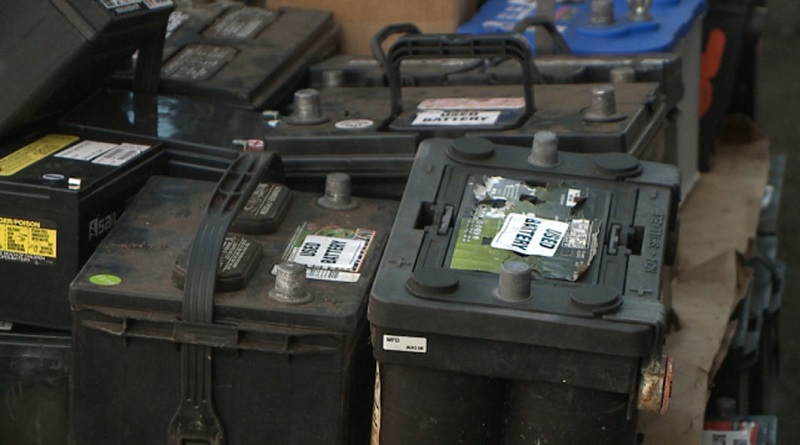NESREA, SRADeV, others seek solution to unsound battery waste management
Apart from generating employment for a lot of youths, battery recycling has also become a major threat to human safety and the environment due to the unsound manners in which it’s is being handled/ managed.
It is as a result of this that all stakeholders in the sub-sector, who converged on Abeokuta from Monday 15th to Friday 19th April 2024 to brainstorm on the best way to mitigate the environmental and health risks associated with sub-standard recycling practices.
The stakeholders that gathered in Abeokuta for the “Inception Workshop On The Project Titled: “Partnership For Responsible Battery and Metal Recycling (PROBAMET)”, comprised officials of the Federal and State Governments, agencies and departments, operators, regulators, policy makers and international institutions.
The inception workshop was organised by the National Environmental Standards and Regulations Enforcement Agency (NESREA) and Ogun State Ministry for Environment in collaboration with the Sustainable Research and Action for Environmental Development (SRADev Nigeria).
The project, which was supported by global institutions such as Oko- Institut e.V. Germany, German Corporation, IGS and Plattform Blei, among others, raised an awareness on improper waste’s management of Used Lead Acid Recycling Products (ULABs).
Justifying the essence of the gathering, the Director – General, NESREA, Prof. Aliyu Jauro, pointed out that batteries, which powered various aspects of human lives, from automobiles to alternative energy systems, posed a significant concern due to their content of toxic and carcinogenic heavy metals like lead and mercury.
Exposure to these substances, he said could lead to severe health issues, including memory loss, high blood pressure, nerve disorders, kidney damage and even death.
He explained that Nigeria, especially, has seen a surge in the use of lead-acid batteries, given their affordability and availability.
While these batteries offer tremendous benefits, the NESREA’s director – general, who was represented by the Director, Inspection and Enforcement, Abudusalam Isah, explained that improper handling of batteries during the recycling process had resulted in environmental contamination and compromised human safety.
He said the project aimed at enhancing the capacity of stakeholders in the used battery value chain by establishing Standard Operating Procedures (SOPs) and promoting sustainability in their operations.
According to him, it also aimed to mitigate the environmental and health risks associated with sub-standard recycling practices.
“As part of this endeavor, we will conduct assessments of selected recycling facilities to evaluate their policies and practices regarding the proper handling of used batteries. This project ultimately aims to safeguard the health and well-being of Nigerians and protect our environment and natural resources for future generations,” he said.
He explained that the agency has embarked on a journey of collaboration, innovation, and collective action in addressing one of Nigeria’s most pressing environmental challenges: the promotion of responsible used battery and non-ferrous metal recycling.
He pointed out that Ogun State was selected to host the inception workshop because of the high number of used battery recycling and collection facilities in the state.
The director – general urged all stakeholders to seize the opportunity to contribute their expertise, insights, and ideas towards shaping the future of responsible used battery recycling in Nigeria.
“Let us work hand in hand to build a battery sector that is not only economically viable but also socially responsible and environmentally sustainable.
“I would like to express my sincere appreciation to our partners, the German Government, SRADev Nigeria, and GIZ Nigeria, for their support and commitment to environmental sustainability in Nigeria. NESREA is ready to support the project in order to achieve its objectives,” he said.
Commissioner for Environment, Ogun State, Mr. Ola Oresanya, while thanking the stakeholders for coming down to the state to promote responsible battery recycling, mentioned that the state played host to the big players in the recycling of batteries and non-ferrous metals.
He called for a collective roadmap for responsible battery recycling in the state.
The Oba of Ogijo, Oba Kazeem Gbadamosi, bemoaned the reckless disposal of battery waste in his kingdom by recyclers.
He called on the regulators to ensure that the recyclers adopted global best practice.
The workshop was attended by stakeholders from Lagos and Ogun states’ ministries of environment and civil society organisations.
SRADev Nigeria’s Executive Director, Dr Leslie Adogame, described PROBAMET as a project initiative that is bringing different angles of partnership between government and industry, and the whole communities in such a way that there capacity will be built, the enabling environment will be enhanced.
He said: “Whatever the gap that is responsible for unsound recycling practices will be addressed.
“We are lucky to collaborate with big funders like the IGS of Germany, International Lead Association, so that recyclers can learn the best environmental practice and best available technology that will produce and enable them to perform in a very best way.”
“This is the first phase of the project. We are looking at engaging the industries,” Adogame said.
SRADeV cheif explained that a lot of used lead acid batteries were being done in environmentally unsound manner.
According to him, though the government recommended recycling as the best approach for materials recovery for any waste materials but that this has become an environmentally unsound.
“We decided that the solution is to raise a national advocacy around and to do it better, is to collaborate with the institutions either from the policy point of view or from the regulatory point of view.
While putting regulatory framework in place is not sufficient to solve the problem, he said the thinking is towards collaborative efforts because used lead acid batteries had remained a big employer of labour.
To ensure sustainable development, the NESREA director – General said the Federal Government established NESREA with the mandate to enforce compliance with environmental laws, guidelines, policies, standards, and regulations in Nigeria.
“NESREA also plays a crucial role in upholding international environmental agreements. In pursuit of these goals, NESREA has championed the development of thirty-five (35) National Environmental Regulations, focusing on pollution prevention and waste management to maintain the integrity of our ecosystem.
“These regulations set minimum permissible limits for all activities, promote cleaner production processes, and encourage waste-to-resource initiatives.
Recognising the challenges posed by improper used battery handling, he stated that the Federal Ministry of Environment has developed the National Policy on Waste Battery Management, and NESREA has developed the National Environmental (Battery Control) Regulations, which are currently being finalized for implementation.
“These regulations aim to prevent and minimize pollution and waste from used batteries. Additionally, they introduce the concept of Extended Producer Responsibility (EPR), making producers and manufacturers responsible for managing their products throughout their life cycle. EPR is a collaborative framework between the government, businesses, and society, working towards a zero- waste society,” he said
In line with the EPR program, he added that NESREA had registered the Alliance for Responsible Battery Recycling (ARBR) as the Producer Responsibility Organization (PRO) for the battery sector.
According to him, used battery collectors, recyclers, and other stakeholders in the value chain are expected to comply with the EPR program and work with ARBR to ensure its success.
He said he was delighted that the project, “Partnership for Responsible Battery and Metal Recycling (PROBAMET),” came to Nigeria at a time when the country is committed to adopting the principles of circular economy and resource efficiency.
The initiative, he added has presented a unique opportunity to create a win- win scenario where environmental protection aligns with economic prosperity and improved social well -being.




